Willison Crites
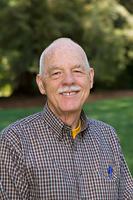 Willison “Will” Crites, retired from a long career in the agricultural chemical industry, is a loyal alumnus who spearheads reunions with fellow entomology graduates and is a committed philanthropic supporter of UC Davis. He is being honored among “Outstanding Alumni” with a 2013 CA&ES Award of Distinction.
Willison “Will” Crites, retired from a long career in the agricultural chemical industry, is a loyal alumnus who spearheads reunions with fellow entomology graduates and is a committed philanthropic supporter of UC Davis. He is being honored among “Outstanding Alumni” with a 2013 CA&ES Award of Distinction.
Crites earned two degrees in entomology at UC Davis—a bachelor’s in 1958 and a master’s in 1961. After graduation and a five-month tour of Europe on a motorcycle, he went to work with Shell Chemical Company’s agricultural chemical group. His career took him to New Jersey, San Francisco, Portland, Fresno, and eventually to Walnut Creek. He cites his work with the careful introduction of Shell-marketed pyrethroid insecticides as a major accomplishment. He remains active today as an industry consultant.
Crites stays close to campus colleagues through ongoing reunions with UC Davis entomologists and the CALPHA Fraternity (Agricultural Fraternity California), which became Phi Delta Theta. He has twice helped bring entomology graduates from the 1950s through the 1970s back to UC Davis for reunions. He has been instrumental in a CALPHA fraternity reunion and is working on another reunion for the fraternity in 2014.
He is a charter member of the UC Davis Chancellor’s Club and has pledged support for an endowed chair in economic entomology. He also contributes to Doctors Without Borders, Meals on Wheels, the Salvation Army, the Boy Scouts of America, and several organizations searching for a cure for leukemia.
Crites says his major professor was one of the greatest influences in his life. “I attribute much of the success I’ve had in industry to the education I received at the university and especially as the result of mentoring by my dear friend and major professor, the late Dr. W. Harry ‘Doc’ Lange.”
“Will Crites has been an ambassador of goodwill for our department for many years. His passion and commitment is extraordinary. Reunions do not take place by themselves—you need a dedicated alumnus as the primary organizer and Will has been that for us.”
— Professor Michael Parrella, chair, Department of Entomology and Nematology
Glenda Humiston
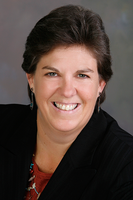 Glenda Humiston, California director of the USDA’s Rural Development program, has devoted her professional life to advancing sustainability in policy development and program implementation. She is being honored among “Outstanding Alumni” with a 2013 CA&ES Award of Distinction.
Glenda Humiston, California director of the USDA’s Rural Development program, has devoted her professional life to advancing sustainability in policy development and program implementation. She is being honored among “Outstanding Alumni” with a 2013 CA&ES Award of Distinction.
She is a government leader with real “hands-on” experience. She worked at her family’s dairy and beef operation in Colorado prior to entering Colorado State University, where she earned her B.S. degree in animal science. She then served in the Peace Corps as an agricultural management specialist in Tunisia, coordinating an $11.2 million dairy development project. She later earned an M.S. degree in international agricultural development at UC Davis, and a Ph.D. degree at UC Berkeley.
Humiston worked with the California Federation of Business and Professional Women as the legislative coordinator, and then became executive director of the Sonoma County Farmlands Group, working to preserve farmland and enhance local agriculture. Later, she was senior partner in AGvocate Consulting Services, leading policy development on agricultural and environmental issues throughout the western U.S. She then accepted a fellowship in the California Agricultural Leadership Program.
She served President Clinton as Deputy Under Secretary for Natural Resources and Environment at the USDA, and she managed programs at the World Summit for Sustainable Development in South Africa and the World Water Forum in Mexico City. Humiston was appointed by President Obama in 2009 to lead USDA Rural Development in California. As state director, she conducted town meetings in all 58 counties to learn about local needs and developed a “Jobs, Economic Development and Sustainable Communities” policy framework for rural California. She also led the California Financial Opportunities Roundtable, which explored alternatives to traditional sources of capital for rural communities and recently published an acclaimed guidebook, “Access to Capital.”
“Glenda’s ability to make things happen is one of her greatest qualities. Her focus on aligning business, regulation and government resources toward on-the-ground solutions has created a sense of optimism and momentum in the rural communities of California.”
— A.G. Kawamura, Orange County Produce grower and former secretary, California Department of Food and Agriculture
Robert Curtis
 Robert “Bob” Curtis, associate manager for agricultural affairs at the Almond Board of California, has been instrumental in bringing crucial support for research and extension programs to improve production practices and enhance environmental stewardship. He is being honored as a “Friend of the College” with a 2013 CA&ES Award of Distinction.
Robert “Bob” Curtis, associate manager for agricultural affairs at the Almond Board of California, has been instrumental in bringing crucial support for research and extension programs to improve production practices and enhance environmental stewardship. He is being honored as a “Friend of the College” with a 2013 CA&ES Award of Distinction.
Curtis previously directed research programs with the California Strawberry Advisory Board and Campbell Soup Company. He now manages issues related to almond production and serves as liaison with the agricultural research community.
“Production research has contributed to the growth and success of California almonds, which now encompass 835,000 acres, rank second in California farm gate value, and are the nation’s largest horticultural export,” Curtis says. Research funded by the Almond Board has also improved fertilizer management and food safety and quality.
He chaired the California Commodity Committee from 2007 to 2012, leading an effort to develop a strategy for promoting and funding commodity research and extension. He was a member of a national specialty crop research team that outlined research, extension, and education priorities for the 2008 Farm Bill, which led to funding for research on nutrient budgeting, irrigation management, precision agriculture, rootstock evaluation, honey bee health, and other areas.
Curtis credits his family, early career mentors, almond industry members and many others with the success he has enjoyed, including Award of Distinction nominator and former CA&ES dean Charley Hess and current CA&ES faculty members Patrick Brown, Ted DeJong, Alyson Mitchell, Tom Tomich, and Frank Zalom. Curtis serves on many UC Davis advisory groups, including the Dean’s Advisory Council. Curtis has written or contributed to more than 200 articles, booklets, and manuals on crop production practices, pest management, postharvest handling, and food safety, and has given presentations to a wide range of domestic and international audiences.
“Bob has worked tirelessly to the betterment of industry-university partnerships that are at the heart of the CA&ES mission. He has made many very significant contributions to the programs of faculty and extension personnel throughout the UC system.”
— Patrick Brown, professor, Department of Plant Sciences
Janet Brown-Simmons
 Janet Brown-Simmons, chief administrative officer for five academic departments in CA&ES, has earned the widespread respect of faculty and staff for her extraordinary leadership abilities. She is being honored as “Outstanding Staff” with a 2013 CA&ES Award of Distinction.
Janet Brown-Simmons, chief administrative officer for five academic departments in CA&ES, has earned the widespread respect of faculty and staff for her extraordinary leadership abilities. She is being honored as “Outstanding Staff” with a 2013 CA&ES Award of Distinction.
She joined CA&ES in 2000 as the management services officer in the Department of Entomology (now the Department of Entomology and Nematology). Her skill at bringing effective change to departmental operations helped resolve issues within the shared administrative units for the departments of Plant Pathology and Nematology—all while continuing to serve as the management services officer for the entomology department. The spirit of cooperation and the resulting administrative efficiencies enabled the department chairs and their faculty to focus on strategic planning, programmatic issues, and other academic initiatives.
Brown-Simmons also has taken on the additional role of chief administrative officer for the “Metro” cluster, which provides staff support for the departments of Environmental Toxicology; Land, Air and Water Resources; and Wildlife, Fish and Conservation Biology. Faculty colleagues describe her as energetic and creative in her efforts to foster team spirit and a shared commitment to the academic mission.
She holds high performance standards for employees, encourages the acquisition of new skills for career development, and is sensitive to work-life balance issues. A strong advocate for the staff, Brown-Simmons has a reputation for using humor to diffuse tensions when conflicts arise.
She served as interim management services officer for the Food Stamp Nutrition Education Program, assumed management responsibilities for Foundation Plant Services, and conducted administrative reviews of many other CA&ES departments. “I wanted to give back to the CA&ES staff, faculty, and chairs partnering with me through the years,” Brown-Simmons said. “The results of this synergy have been incredibly rewarding to me personally—knowing I have made a difference in some small way.”
“Janet has succeeded in creating a positive environment for our staff. This enhances their sense of job satisfaction and their performance. As a consequence, the full department enjoys the benefits of a capable and enthusiastic support team.”
— Professor Thomas Gordon and Professor Richard Bostock, current and past chair, Department of Plant Pathology
Kathryn Dewey
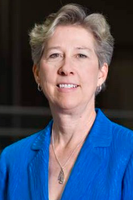 Kathryn “Kay” Dewey, distinguished professor in the Department of Nutrition, has conducted research and led international efforts that have changed global policies for infant feeding and nutrition and the assessment of child growth. She is being honored as “Outstanding Faculty” with a 2013 CA&ES Award of Distinction.
Kathryn “Kay” Dewey, distinguished professor in the Department of Nutrition, has conducted research and led international efforts that have changed global policies for infant feeding and nutrition and the assessment of child growth. She is being honored as “Outstanding Faculty” with a 2013 CA&ES Award of Distinction.
Dewey joined the UC Davis faculty in 1980 after earning her doctorate in biological sciences from the University of Michigan. She is director of the UC Davis Program in International and Community Nutrition and has conducted clinical and community-based research on maternal and child nutrition in the U.S. and several developing countries.
Her research on breastfed and formula-fed infants helped the World Health Organization (WHO) develop new charts to monitor and assess child growth. Other studies by Dewey prompted WHO to make a global recommendation for the exclusive breastfeeding of infants for the first six months of life.
As director of the International Lipid-based Nutrient Supplements (iLiNS) Project, Dewey leads an effort to develop and evaluate a novel approach to “home fortification” for prevention of malnutrition in pregnant and lactating women and their children in Ghana, Malawi, and Burkina Faso. This research consortium is funded by a $21 million grant from the Bill & Melinda Gates Foundation.
Dewey has served as president of the Society for International Nutrition Research and the International Society for Research on Human Milk and Lactation. She has mentored more than 40 graduate students, produced more than 280 publications, and received national and international awards for her work.
“I am very proud to be a member of the faculty at UC Davis, and particularly in the College of Agricultural and Environmental Sciences, where there is such a strong emphasis on research and service that address real-world problems and benefit the public,” Dewey says.
“Kay Dewey is an exceptional colleague whose work is of major importance to the future of children around the world. Her expertise and rigorous research has helped transform national and international policies and practices for infant and young child nutrition.”
— Professor Francene Steinberg, chair, Department of Nutrition
Neal Van Alfen
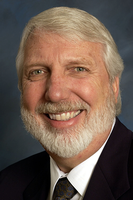 Neal Van Alfen, professor of plant pathology, served as dean of the College of Agricultural and Environmental Sciences for 13 years during some of its most difficult times. He is being honored with a special College Leaders Award of Distinction for outstanding contributions to the college.
Neal Van Alfen, professor of plant pathology, served as dean of the College of Agricultural and Environmental Sciences for 13 years during some of its most difficult times. He is being honored with a special College Leaders Award of Distinction for outstanding contributions to the college.
Van Alfen assumed responsibilities as dean in August 1999 and served in that role until September 2012. The years he was at the helm of the college were particularly challenging because of unprecedented budget reductions. College leadership worked proactively with faculty to strategically reposition CA&ES in ways that would assure continued excellence well into the future.
Under Van Alfen’s watch, significant effort and resources helped raise funds to build and support new research and teaching facilities and programs, such as the Robert Mondavi Institute for Wine and Food Science, the Agricultural Sustainability Institute, and many others. College faculty responded to budgetary challenges by tripling extramural funding and helping raise funds for 14 new endowed chairs.
Van Alfen has returned to faculty life in the Department of Plant Pathology and continues his involvement in global agricultural and environmental issues. He chairs the board of directors of the U.S./Israel Binational Foundation for Agricultural Research and Development, serves on the board of trustees of the Council for Agricultural Science and Technology, and is editor of the Encyclopedia of Agriculture and Food Systems and the Annual Review of Phytopathology. He is a fellow with the American Phytopathological Society and the American Association for the Advancement of Science.
Van Alfen received his B.S. in chemistry and M.S. in botany from Brigham Young University and his Ph.D. in plant pathology from UC Davis. He and his wife, Pam, have a small farm in Winters, Calif., that keeps them busy and provides them with a lot of citrus, wine, and enormous pleasure.
“Neal Van Alfen did a tremendous job during his tenure as dean. With skillful management of resources coupled with an outstanding fundraising program, the college has grown in prestige, attracted excellent students and faculty, and added world class facilities.”
— Dean emeritus Charles Hess, College of Agricultural and Environmental Sciences
James D. MacDonald
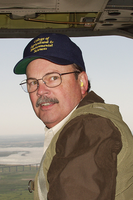 James “Jim” MacDonald, professor emeritus of plant pathology, served as executive associate dean of the College of Agricultural and Environmental Sciences for 13 years. He is being honored with a special College Leaders Award of Distinction for outstanding contributions to the college.
James “Jim” MacDonald, professor emeritus of plant pathology, served as executive associate dean of the College of Agricultural and Environmental Sciences for 13 years. He is being honored with a special College Leaders Award of Distinction for outstanding contributions to the college.
MacDonald chaired a committee in 1998 to develop a new academic plan for the college, which was presented to Neal Van Alfen when he became dean in August 1999. Van Alfen appointed MacDonald executive associate dean in September 1999, a position he held through August 2012.
During his tenure, MacDonald worked closely with the dean and colleagues to launch initiatives and to provide the best possible stewardship of resources during periods of serious budget challenges. He was delegated responsibility for all matters related to academic and staff personnel management, including faculty recruitments, retentions, and advancement. He also served as the college’s representative to the division of Agriculture and Natural Resources’ Program Council.
Outside the UC system, MacDonald served many leadership roles in the American Phytopathological Society, notably as president. He received the society’s Distinguished Service Award—awarded only five times in the award’s 25 year history.
As a leader who dealt with difficult issues that often engendered conflicting points of view, MacDonald always sought to bring fairness, honesty, and integrity to the table, and to follow through on commitments made to others. This helped in the successful resolution of countless issues over his years as executive associate dean.
MacDonald joined the faculty in 1978 after completing his B.S., M.S., and Ph.D. degrees in plant pathology at UC Davis. His research focused on root diseases of plants, and he worked extensively with California’s nursery industry to improve disease diagnosis and prevention. In retirement, Jim and his wife, Judy, are devoting time to grandkids, hobbies and travel.
“Jim has always been highly trustworthy, most sincere, and very responsive to matters of concern to department chairs. Over the years he became the person in the Dean’s Office to go to for getting answers.”
— Professor Chris van Kessel, chair, Department of Plant Sciences